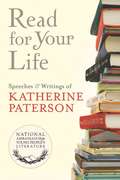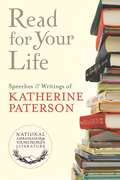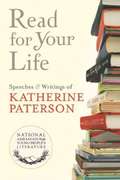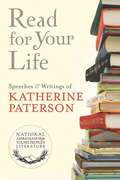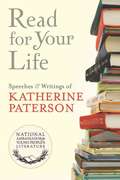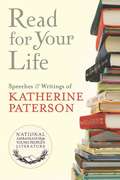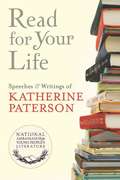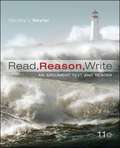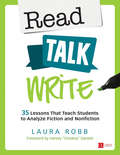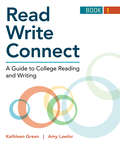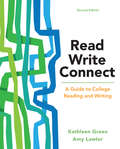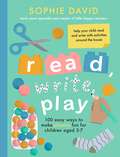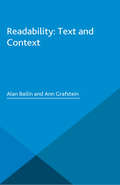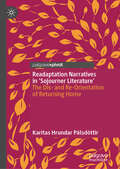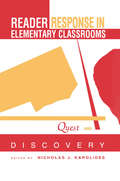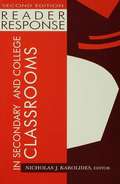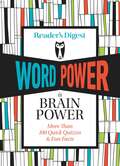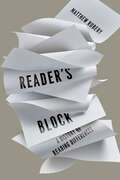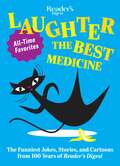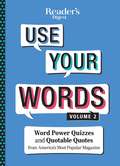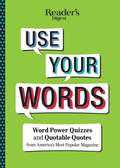- Table View
- List View
Read for Your Life #21
by Katherine PatersonHoughton Mifflin Harcourt is publishing a monthly series of e-only essays to correspond with Katherine Paterson's two-year term as the National Ambassador for Young People's Literature. The subjects of the essays include: writing and literature for young people, the wonder and imagination found within great books, common questions novice writers ask, and Katherine's own personal experiences throughout her historic career.
Read for Your Life #3
by Katherine PatersonHoughton Mifflin Harcourt is publishing a monthly series of e-only essays to correspond with Katherine Paterson's two-year term as the National Ambassador for Young People's Literature. The subjects of the essays include: writing and literature for young people, the wonder and imagination found within great books, common questions novice writers ask, and Katherine's own personal experiences throughout her historic career.
Read for Your Life #4
by Katherine PatersonHoughton Mifflin Harcourt is publishing a monthly series of e-only essays to correspond with Katherine Paterson's two-year term as the National Ambassador for Young People's Literature. The subjects of the essays include: writing and literature for young people, the wonder and imagination found within great books, common questions novice writers ask, and Katherine's own personal experiences throughout her historic career.
Read for Your Life #5
by Katherine PatersonHoughton Mifflin Harcourt is publishing a monthly series of e-only essays to correspond with Katherine Paterson's two-year term as the National Ambassador for Young People's Literature. The subjects of the essays include: writing and literature for young people, the wonder and imagination found within great books, common questions novice writers ask, and Katherine's own personal experiences throughout her historic career.
Read for Your Life #6
by Katherine PatersonHoughton Mifflin Harcourt is publishing a monthly series of e-only essays to correspond with Katherine Paterson's two-year term as the National Ambassador for Young People's Literature. The subjects of the essays include: writing and literature for young people, the wonder and imagination found within great books, common questions novice writers ask, and Katherine's own personal experiences throughout her historic career.
Read for Your Life #7
by Katherine PatersonHoughton Mifflin Harcourt is publishing a monthly series of e-only essays to correspond with Katherine Paterson's two-year term as the National Ambassador for Young People's Literature. The subjects of the essays include: writing and literature for young people, the wonder and imagination found within great books, common questions novice writers ask, and Katherine's own personal experiences throughout her historic career.
Read for Your Life #8
by Katherine PatersonHoughton Mifflin Harcourt is publishing a monthly series of e-only essays to correspond with Katherine Paterson's two-year term as the National Ambassador for Young People's Literature. The subjects of the essays include: writing and literature for young people, the wonder and imagination found within great books, common questions novice writers ask, and Katherine's own personal experiences throughout her historic career.
Read for Your Life #9
by Katherine PatersonHoughton Mifflin Harcourt is publishing a monthly series of e-only essays to correspond with Katherine Paterson's two-year term as the National Ambassador for Young People's Literature. The subjects of the essays include: writing and literature for young people, the wonder and imagination found within great books, common questions novice writers ask, and Katherine's own personal experiences throughout her historic career.
Read, Reason, Write: An Argument Text and Reader (Eleventh Edition)
by Dorothy SeylerRead, Reason, Write unites instruction in critical reading and analysis, argument, and research strategies with a rich collection of readings that provide both practice for these skills and new ideas and insights for readers. Read, Reason, Write is committed to showing students how reading, analytic, argumentative, and research skills are interrelated and how these skills combine to develop each student's critical thinking ability.
Read, Talk, Write: 35 Lessons That Teach Students to Analyze Fiction and Nonfiction (Corwin Literacy)
by Laura J. RobbYes—we can have our cake and eat it too! We can improve students’ reading and writing performance without sacrificing authenticity. In Read, Talk, Write, Laura Robb shows us how. First, she makes sure students know the basics of six types of talk. Next, she shares 35 lessons that support rich conversation. Finally, she includes new pieces by Seymour Simon, Kathleen Krull, and others so you have texts to use right away. Read, Talk, Write: it’s a process your students not only can do, but one they will love to do.
Read, Talk, Write: 35 Lessons That Teach Students to Analyze Fiction and Nonfiction (Corwin Literacy)
by Laura J. RobbYes—we can have our cake and eat it too! We can improve students’ reading and writing performance without sacrificing authenticity. In Read, Talk, Write, Laura Robb shows us how. First, she makes sure students know the basics of six types of talk. Next, she shares 35 lessons that support rich conversation. Finally, she includes new pieces by Seymour Simon, Kathleen Krull, and others so you have texts to use right away. Read, Talk, Write: it’s a process your students not only can do, but one they will love to do.
Read, Write, Connect, Book 1: A Guide to College Reading and Writing
by Kathleen Green Amy LawlorThe first text in a two-part series for the integrated reading and writing course, Read, Write, Connect, Book 1, offers carefully and thoroughly integrated instruction for reading and writing at the paragraph-to-essay level. With scaffolded pedagogy and a flexible structure that reflects the recursive nature of reading and writing processes, the text allows instructors to easily differentiate instruction to meet the needs of all students. It offers intensive practice in the basic skills of reading comprehension and summary writing, and then helps students build on those skills to respond to texts critically and analytically in their own college-level paragraphs and short essays. LaunchPad Solo for Readers and Writers can be packaged with Read, Write, Connect, Book 1 at no additional cost,, allowing you to more efficiently track students’ progress with reading, writing, and grammar skills in an active learning arc that complements the book.
Read, Write, Connect: A Guide to College Reading and Writing
by Kathleen Green Amy LawlorRead, Write, Connect provides integrated instruction in reading and writing paragraphs and essays with a thematic reader full of high-interest selections students will want to read and write about. The text begins with a walk-through of the reading and writing processes and then moves on to a series of workshop chapters that provide in-depth coverage of key topics like finding main ideas and drafting and organizing an essay. Throughout, the text demonstrates that academic processes are recursive, and the structure of the text reflects this recursivity: as students move from the early chapters to the workshop chapters, they build upon earlier learning, digging deeper into the material and gaining confidence along the way. The second edition offers new chapters and new features devoted to stronger, more integrated coverage of reading; expanded coverage of research and grammar; and exciting new readings, class-tested by the authors. Read, Write, Connect, Second Edition, can be packaged with LaunchPad Solo for Readers and Writers, allowing you to more efficiently track students’ progress with reading, writing, and grammar skills in an active learning arc that complements the book.
Read, Write, Play: 100 Easy Ways to Make Phonics Fun for Children Aged 3-7
by Sophie DavidUnlock the joy of reading and writing with Read, Write, Play, a hands-on guide featuring 100 fun and engaging activities that support children aged 3-7 on their phonics journey.Whether you're supporting school lessons or starting at home, this book provides all the guidance you need - with no prior knowledge of phonics required. It is the perfect resource for parents, carers and educators who want to transform phonics into a playful, accessible adventure.Children learn best through play, and every activity in this book is designed to be fun and quick to set up, using common household items like paper cups and craft sticks. These multi-sensory and adaptable activities cater to all learning styles, making phonics enjoyable and rewarding for every child.Covering all six phases of the phonics curriculum, it starts with pre-reading skills and progresses to advanced topics like irregular plurals and suffixes. Clear explanations and tailored activities ensure children can build their skills confidently at their own pace.Phonics doesn't have to be daunting. With Read, Write, Play, it can be playful, memorable and even magical.
Read, Write, Play: 100 Easy Ways to Make Phonics Fun for Children Aged 3-7
by Sophie DavidUnlock the joy of reading and writing with Read, Write, Play, a hands-on guide featuring 100 fun and engaging activities that support children aged 3-7 on their phonics journey.Whether you're supporting school lessons or starting at home, this book provides all the guidance you need - with no prior knowledge of phonics required. It is the perfect resource for parents, carers and educators who want to transform phonics into a playful, accessible adventure.Children learn best through play, and every activity in this book is designed to be fun and quick to set up, using common household items like paper cups and craft sticks. These multi-sensory and adaptable activities cater to all learning styles, making phonics enjoyable and rewarding for every child.Covering all six phases of the phonics curriculum, it starts with pre-reading skills and progresses to advanced topics like irregular plurals and suffixes. Clear explanations and tailored activities ensure children can build their skills confidently at their own pace.Phonics doesn't have to be daunting. With Read, Write, Play, it can be playful, memorable and even magical.
Readability: Text and Context
by Alan Bailin Ann GrafsteinThis book explores what makes a book readable by bringing together the relevant literature and theories, and situating them within a unified account. It provides a single resource that offers a principled discussion of the issues and their applications.
Readaptation Narratives in 'Sojourner Literature': The Dis- and Re-Orientation of Returning Home
by Karítas Hrundar PálsdóttirThis Palgrave Pivot makes a case for &‘sojourner literature&’, a new literary genre within transnational literature, parallel to &‘immigrant literature&’, and its subgenre &‘readaptation narratives&’. Sojourners are a privileged group of migrants who travel freely and by choice, and yet they struggle with the experience of returning home. Through contextualization, readaptation narratives open psychological concepts like grief, ambiguous loss, identity shifts, and coping styles, while the psychology deepens the reading of the narrative form and its exposition of in-betweenness. The novels explored are A Concise Chinese-English Dictionary for Lovers, Americanah, Dear Pakistan, The Reluctant Fundamentalist, and two Icelandic novels that have not been translated into English, Að heiman [Away from Home] and Mávahlátur [Seagulls Laughter]. The analysis reveals two new metaphors that help ground the meaning of dis-/re-orientation in the context of readaptation and suggests that the existing readaptation framework requires expansion to better deal with the complexity of the phenomenon.
Reader Response in Elementary Classrooms: Quest and Discovery
by Nicholas J. KarolidesReading is a quest. Likened to an adventure -- both metaphoric and real -- the quest is a journey of discovery. The reader's search encompasses the sensations of the experience itself, accompanying emotions, sense and meaning engendered by the experience, and understandings of the self, others, and the world around. Out of curiosity, readers also search for an extensive array of information. The journey can be envisioned and contemplated again and again after the reading act itself is completed. In a meaningful way, the reader's quest and its discoveries are life enduring and life fulfilling. The purpose of this volume is two-fold: * to establish and explore the essential features of reader response theory and its rendering of the reading process, and * to acknowledge a philosophy of teaching and to illustrate teaching strategies to evoke and enhance readers' responses. Understanding the ways in which the reader affects the reading and how the reading happens will illuminate classroom pedagogy. This text establishes and explores the essential features of reader response theory and its rendering of the reading process. The essays acknowledge a philosophy of teaching and illustrate a spectrum of teaching strategies to evoke and enhance readers' responses, including whole and small-group discussion; story drama; readers' theatre; journal writing; scripts, letters, stories, and other writings; and "body punctuation." A case study format is used to illustrate these strategies in action in real classrooms.
Reader Response in Secondary and College Classrooms
by Nicholas J. KarolidesThis text, based on Louise M. Rosenblatt's transactional model of literature, focuses on the application of transactional reader-response theory in the classroom. It grows from frequent requests from secondary school and college teachers for teaching suggestions on how to put theory into practice. This is not a "What should I do on Monday?" cookbook, but an expression of the practice of theory in college and secondary school classrooms. The chapters portray a spectrum of strategies--including biopoems, expressive and imaginative writing, journal writing, readers' theater, role playing, and unsent letters--using as examples individual works from several genres. Recognizing that teachers who may have been trained in other theories and methodologies may be hesitant about their quite different role and expectations in the reader-centered classroom, the authors provide stepping stones to develop readiness and confidence, suggestions, and insights to ease the transition to the transactional model of teaching and learning. Pedagogical features: * An explanatory introduction to each section defines its orientation and describes the content and direction of the chapters it contains. * Invitations elicit engagement of readers with concepts, attitudes, or strategies presented in the chapters; they invite readers, as individuals or members of a small group, to consider ideas or to practice a strategy, among other activities, in order to enhance understandings. * A glossary defines key concepts and strategies discussed in the text. * A bibliography provides an extensive list of resources--books and journal articles--both theoretical and applied. New in the second edition: * Six new chapters--three deal with the roles of film-as-literature in the English classroom, and three with enhancing multicultural understandings. * Updates and revisions to several chapters that appeared in the first edition. * Invitations, new in this edition, have been added to focus and expand readers' thinking.
Reader' s Digest Word Power is Brain Power
by Reader'S DigestA collection of Word Power quizzes and other fun language and grammar facts that will appeal to word nerds, knowledge hunters, and students of all ages. Want to sound smarter in business meetings? Finally beat your brainy uncle at Word Cookies? Ace that standardized test? Whatever your reasons for wanting to improve your vocabulary, you won&’t find a funner way of doing so than Word Power (and yes, &“funner&” is really a word!). For instance, do you know what these words mean: Orthoepy – A: code. B: proper pronunciation. C: sign language. Zyzzyva – A: type of weevil. B: tricky situation. C: fertilized cell Fricassee – A: cut and stew in gravy. B: deep-fry. C: sautee with mushrooms And do know when it&’s okay to use a double negative or start a sentence with &“Because&”? Word Power will answer all these questions and much more for hours of language fun for word nerds and grammar gurus.
Reader's Block: A History of Reading Differences
by Matthew RuberyWhat does the term "reading" mean? Matthew Rubery's exploration of the influence neurodivergence has on the ways individuals read asks us to consider that there may be no one definition. This alternative history of reading tells the stories of "atypical" readers and the impact had on their lives by neurological conditions affecting their ability to make sense of the printed word: from dyslexia, hyperlexia, and alexia to synesthesia, hallucinations, and dementia. Rubery's focus on neurodiversity aims to transform our understanding of the very concept of reading. Drawing on personal testimonies gathered from literature, film, life writing, social media, medical case studies, and other sources to express how cognitive differences have shaped people's experiences both on and off the page, Rubery contends that there is no single activity known as reading. Instead, there are multiple ways of reading (and, for that matter, not reading) despite the ease with which we use the term. Pushing us to rethink what it means to read, Reader's Block moves toward an understanding of reading as a spectrum that is capacious enough to accommodate the full range of activities documented in this fascinating and highly original book. Read it from cover to cover, out of sequence, or piecemeal. Read it upside down, sideways, or in a mirror. For just as there is no right way to read, there is no right way to read this book. What matters is that you are doing something with it—something that Rubery proposes should be called "reading."
Reader's Companion for Prentice Hall Timeless Voices, Timeless Themes (Bronze Level)
by Pearson Prentice HallThe Reader's Companion is a special kind of literature book, one that will guide you to become an active reader. Each unit contains two selections with notes and suggestions that will help you become actively involved in what you read and help you practice the sets of skills that effective readers use.
Reader's Digest Laughter is the Best Medicine: All Time Favorites (Laughter Medicine)
by Reader'S DigestA hilarious collection of the funniest family-friendly jokes, quotes, stories, cartoons, and anecdotes from the past 100 years of Reader&’s Digest magazine. A little chuckle every day will keep the doctor away.Editors have mined the Reader&’s Digest archives to bring you Laughter Is the Best Medicine, All-Time Favorites, a collection of the most hilarious jokes and anecdotes we&’ve come across over the years. As you turn the pages of our newest collection, you&’ll realize once again that laughter is always the best medicine. If evolution really works, how come mothers have only two hands? –Milton Berle The game card said: &“Name three wars.&” My teenage daughter&’s response: &“Civil War, Revolutionary War, and Star Wars.&” Keep your temper. Nobody wants it. –Dearborn Independent Check out this billion-dollar idea. A smoke detector that shuts off when you yell, &“I&’m just cooking!&” Anthropologists have discovered a 50-million-year-old human skull with three perfectly preserved teeth intact. They're not sure, but they think it may be the remains of the very first hockey player. –Jay Leno This collection of laugh-out-loud, clean jokes, one-liners, and other lighthearted glimpses of life—drawn from Reader&’s Digest magazine&’s most popular humor columns—is sure to tickle the funny bone. Packed with cartoons, quotes, quips, and stories contributed by professional comedians, joke writers, and readers of the magazine, this side-splitting compilation pokes fun at the facts and foibles of daily routines, illustrating that life is often funnier than fiction.
Reader's Digest Use Your Words vol 2: Word Power Quizzes from America's Most Popular magazine
by Reader'S DigestWant to feel smarter? Want to have the perfect quip at the tip of your tongue? Like the successful first volume in the series, Use Your Words, Volume 2 combines Word Power Quizzes and Quotable Quotes from Reader's Digest, America's Most Popular Magazine so you can do just that! Following on the success of the first volume, Use Your Words, Volume 2, combines new selections from reader favorites Quotable Quotes and Word Power. Both of these columns have run in Reader’s Digest magazine for more than seventy years. In these pages you’ll find the best wit and wisdom from our brightest minds, along with more than fifty quizzes to enrich your vocabulary. With this gem in your hands, you’ll never be at a loss for just the right word. Inside you’ll find: —Quotes about everything from love to success to aging —Toasts for every occasion —Entertaining quizzes of amusing words —And more!
Reader's Digest Use Your Words: Word Power Quizzes & Quotable Quotes from America's Most Popular Magazine
by Reader'S DigestWant to feel smarter? Want to have the perfect quip at the tip of your tongue? Use Your Words combines Word Power Quizzes and Quotable Quotes from Reader's Digest, Amercia's Most Popular Magazine so you can do just that! <P><P>Use Your Words is part word quiz book and part quote book, combined together in themed sections. It will be a combination of 2 of our most popular columns in Reader’s Digest Magazine—Word Power and Quotable Quotes. Quotable Quotes, as it appears today, first ran in January 1934. It was proceeded by similar quote columns, including Remarkable Remarks, which ran in the first ever issue of Reader's Digest in February 1922, and Significant Sayings, which ran in June 1922. <P><P>These first columns featured the great minds of the day, including Herbert Hoover (before he became president), Lady Astor, and John D. Rockefeller. The quotes were, and continue to be, collected from a variety of books, speeches, journals, and articles. We've quoted both living and dead people. The column hasn't changed much, except for the art. It began as a one-page list of quotes and continues to be a one-page list of quotes. Quotable Quotes is second to Laughter the Best Medicine in column popularity. Word Power first ran in January 1945—January 2020 will mark 75 years. <P><P>Word Power's creator, Wilfred Funk, was a poet and lexicographer—his family was the “Funk” of the reference publisher Funk & Wagnalls. He presented his quiz idea to Dewitt Wallace in 1944. Wilfred's son Peter Funk wrote the column from the 1960s to the 1990s. Current writers are a married couple who are well-known in the crossword/puzzle world: https://www.theatlantic.com/past/docs/unbound/wordgame/crbio.htm The column hasn’t changed much—it has 15 words now instead of 20. It has themed columns (car words, Italian words) rather than words based on RD. It has a sidebar that goes in-depth on something related to the theme. Word Power is our 3rd most popular column in the magazine.
